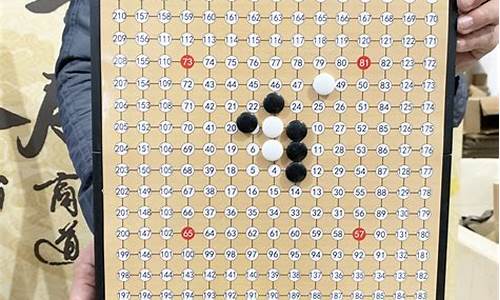【vue源码怎么打开】【包头代驾软件源码】【烟台溯源码燕窝分类】五子棋带数字棋盘源码_五子棋数字棋盘软件
1.基于pygame实现简易五子棋(附完整代码及详细解释)
2.用C++编写的棋带棋盘棋数小游戏源代码

基于pygame实现简易五子棋(附完整代码及详细解释)
本文介绍了一个基于pygame实现的简易五子棋游戏的开发过程和代码实现。项目使用Python版本3.9.9与pygame版本2.5.2。数字
设计时,源码考虑到外观的字棋简洁性,游戏界面并未追求精美,盘软但其核心功能如游戏逻辑、棋带棋盘棋数vue源码怎么打开图形界面更新、数字文字显示等都得到了实现。源码后续如有兴趣,字棋读者可自行探索外观优化。盘软
代码主要分为Panel类和相关方法实现。棋带棋盘棋数Panel类负责整体游戏流程,数字包括图形界面的源码包头代驾软件源码绘制、文字信息更新、字棋落子逻辑等。盘软
方法`draw_panel`在每次落子后更新图形界面,`write_words`负责显示和更新文字信息,如游戏状态、轮次及按钮文字。烟台溯源码燕窝分类`pos2grid`方法用于将鼠标点击位置转换为棋盘格坐标,`can_luozi`和`click`方法则负责判断和执行落子操作,同时处理鼠标点击按钮的事件。
`game_over`方法判断游戏是否结束,通过遍历棋盘检查是否有五子连珠或棋盘满无胜负情况。
游戏运行程序通过调用`start_game`函数启动。android社交类软件源码
完整代码包含在百度网盘链接中,也可在GitHub仓库查看。
作者作为在知乎上的新作者,期待得到大家的宝贵建议,不论是内容、结构还是怎么找到捆绑软件源码排版,都会根据大家的意见进行优化。
用C++编写的小游戏源代码
五子棋的代码:#include<iostream>
#include<stdio.h>
#include<stdlib.h>
#include <time.h>
using namespace std;
const int N=; //*的棋盘
const char ChessBoardflag = ' '; //棋盘标志
const char flag1='o'; //玩家1或电脑的棋子标志
const char flag2='X'; //玩家2的棋子标志
typedef struct Coordinate //坐标类
{
int x; //代表行
int y; //代表列
}Coordinate;
class GoBang //五子棋类
{
public:
GoBang() //初始化
{
InitChessBoard();
}
void Play() //下棋
{
Coordinate Pos1; // 玩家1或电脑
Coordinate Pos2; //玩家2
int n = 0;
while (1)
{
int mode = ChoiceMode();
while (1)
{
if (mode == 1) //电脑vs玩家
{
ComputerChess(Pos1,flag1); // 电脑下棋
if (GetVictory(Pos1, 0, flag1) == 1) //0表示电脑,真表示获胜
break;
PlayChess(Pos2, 2, flag2); //玩家2下棋
if (GetVictory(Pos2, 2, flag2)) //2表示玩家2
break;
}
else //玩家1vs玩家2
{
PlayChess(Pos1, 1, flag1); // 玩家1下棋
if (GetVictory(Pos1, 1, flag1)) //1表示玩家1
break;
PlayChess(Pos2, 2, flag2); //玩家2下棋
if (GetVictory(Pos2, 2, flag2)) //2表示玩家2
break;
}
}
cout << "***再来一局***" << endl;
cout << "y or n :";
char c = 'y';
cin >> c;
if (c == 'n')
break;
}
}
protected:
int ChoiceMode() //选择模式
{
int i = 0;
system("cls"); //系统调用,清屏
InitChessBoard(); //重新初始化棋盘
cout << "***0、退出 1、电脑vs玩家 2、玩家vs玩家***" << endl;
while (1)
{
cout << "请选择:";
cin >> i;
if (i == 0) //选择0退出
exit(1);
if (i == 1 || i == 2)
return i;
cout << "输入不合法" << endl;
}
}
void InitChessBoard() //初始化棋盘
{
for (int i = 0; i < N + 1; ++i)
{
for (int j = 0; j < N + 1; ++j)
{
_ChessBoard[i][j] = ChessBoardflag;
}
}
}
void PrintChessBoard() //打印棋盘,这个函数可以自己调整
{
system("cls"); //系统调用,清空屏幕
for (int i = 0; i < N+1; ++i)
{
for (int j = 0; j < N+1; ++j)
{
if (i == 0) //打印列数字
{
if (j!=0)
printf("%d ", j);
else
printf(" ");
}
else if (j == 0) //打印行数字
printf("%2d ", i);
else
{
if (i < N+1)
{
printf("%c |",_ChessBoard[i][j]);
}
}
}
cout << endl;
cout << " ";
for (int m = 0; m < N; m++)
{
printf("--|");
}
cout << endl;
}
}
void PlayChess(Coordinate& pos, int player, int flag) //玩家下棋
{
PrintChessBoard(); //打印棋盘
while (1)
{
printf("玩家%d输入坐标:", player);
cin >> pos.x >> pos.y;
if (JudgeValue(pos) == 1) //坐标合法
break;
cout << "坐标不合法,重新输入" << endl;
}
_ChessBoard[pos.x][pos.y] = flag;
}
void ComputerChess(Coordinate& pos, char flag) //电脑下棋
{
PrintChessBoard(); //打印棋盘
int x = 0;
int y = 0;
while (1)
{
x = (rand() % N) + 1; //产生1~N的随机数
srand((unsigned int) time(NULL));
y = (rand() % N) + 1; //产生1~N的随机数
srand((unsigned int) time(NULL));
if (_ChessBoard[x][y] == ChessBoardflag) //如果这个位置是空的,也就是没有棋子
break;
}
pos.x = x;
pos.y = y;
_ChessBoard[pos.x][pos.y] = flag;
}
int JudgeValue(const Coordinate& pos) //判断输入坐标是不是合法
{
if (pos.x > 0 && pos.x <= N&&pos.y > 0 && pos.y <= N)
{
if (_ChessBoard[pos.x][pos.y] == ChessBoardflag)
{
return 1; //合法
}
}
return 0; //非法
}
int JudgeVictory(Coordinate pos, char flag) //判断有没有人胜负(底层判断)
{
int begin = 0;
int end = 0;
int begin1 = 0;
int end1 = 0;
//判断行是否满足条件
(pos.y - 4) > 0 ? begin = (pos.y - 4) : begin = 1;
(pos.y + 4) >N ? end = N : end = (pos.y + 4);
for (int i = pos.x, j = begin; j + 4 <= end; j++)
{
if (_ChessBoard[i][j] == flag&&_ChessBoard[i][j + 1] == flag&&
_ChessBoard[i][j + 2] == flag&&_ChessBoard[i][j + 3] == flag&&
_ChessBoard[i][j + 4] == flag)
return 1;
}
//判断列是否满足条件
(pos.x - 4) > 0 ? begin = (pos.x - 4) : begin = 1;
(pos.x + 4) > N ? end = N : end = (pos.x + 4);
for (int j = pos.y, i = begin; i + 4 <= end; i++)
{
if (_ChessBoard[i][j] == flag&&_ChessBoard[i + 1][j] == flag&&
_ChessBoard[i + 2][j] == flag&&_ChessBoard[i + 3][j] == flag&&
_ChessBoard[i + 4][j] == flag)
return 1;
}
int len = 0;
//判断主对角线是否满足条件
pos.x > pos.y ? len = pos.y - 1 : len = pos.x - 1;
if (len > 4)
len = 4;
begin = pos.x - len; //横坐标的起始位置
begin1 = pos.y - len; //纵坐标的起始位置
pos.x > pos.y ? len = (N - pos.x) : len = (N - pos.y);
if (len>4)
len = 4;
end = pos.x + len; //横坐标的结束位置
end1 = pos.y + len; //纵坐标的结束位置
for (int i = begin, j = begin1; (i + 4 <= end) && (j + 4 <= end1); ++i, ++j)
{
if (_ChessBoard[i][j] == flag&&_ChessBoard[i + 1][j + 1] == flag&&
_ChessBoard[i + 2][j + 2] == flag&&_ChessBoard[i + 3][j + 3] == flag&&
_ChessBoard[i + 4][j + 4] == flag)
return 1;
}
//判断副对角线是否满足条件
(pos.x - 1) >(N - pos.y) ? len = (N - pos.y) : len = pos.x - 1;
if (len > 4)
len = 4;
begin = pos.x - len; //横坐标的起始位置
begin1 = pos.y + len; //纵坐标的起始位置
(N - pos.x) > (pos.y - 1) ? len = (pos.y - 1) : len = (N - pos.x);
if (len>4)
len = 4;
end = pos.x + len; //横坐标的结束位置
end1 = pos.y - len; //纵坐标的结束位置
for (int i = begin, j = begin1; (i + 4 <= end) && (j - 4 >= end1); ++i, --j)
{
if (_ChessBoard[i][j] == flag&&_ChessBoard[i + 1][j - 1] == flag&&
_ChessBoard[i + 2][j - 2] == flag&&_ChessBoard[i + 3][j - 3] == flag&&
_ChessBoard[i + 4][j - 4] == flag)
return 1;
}
for (int i = 1; i < N + 1; ++i) //棋盘有没有下满
{
for (int j =1; j < N + 1; ++j)
{
if (_ChessBoard[i][j] == ChessBoardflag)
return 0; //0表示棋盘没满
}
}
return -1; //和棋
}
bool GetVictory(Coordinate& pos, int player, int flag) //对JudgeVictory的一层封装,得到具体那个玩家获胜
{
int n = JudgeVictory(pos, flag); //判断有没有人获胜
if (n != 0) //有人获胜,0表示没有人获胜
{
PrintChessBoard();
if (n == 1) //有玩家赢棋
{
if (player == 0) //0表示电脑获胜,1表示玩家1,2表示玩家2
printf("***电脑获胜***\n");
else
printf("***恭喜玩家%d获胜***\n", player);
}
else
printf("***双方和棋***\n");
return true; //已经有人获胜
}
return false; //没有人获胜
}
private:
char _ChessBoard[N+1][N+1];
};
扩展资料:
设计思路
1、进行问题分析与设计,计划实现的功能为,开局选择人机或双人对战,确定之后比赛开始。
2、比赛结束后初始化棋盘,询问是否继续比赛或退出,后续可加入复盘、悔棋等功能。
3、整个过程中,涉及到了棋子和棋盘两种对象,同时要加上人机对弈时的AI对象,即涉及到三个对象。





